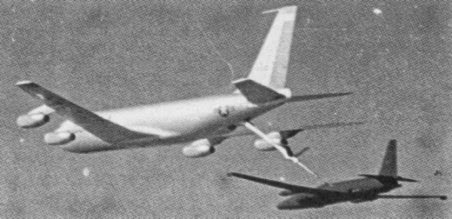October 21st in the Cuban Missile Crisis

Follow the inside story of the Cuban Missile Crisis as it evolves day by day from now through October 28!
Read: Yesterday Tomorrow Beginning of Series
(Photograph: A U-2 spyplane is refueled by a KC-135 tanker during the Cuban Missile Crisis.)
Blockade vs. Airstrikes
Sunday, October 21, 1962, was the sixth of the “Thirteen Days” Bobby Kennedy referred to in the title to his book about the Cuban Missile Crisis.
JFK decided that he wanted one more meeting before making the final decision on whether to impose a blockade on Cuba or whether to order airstrikes. General Walter Sweeney, commander of TAC (Tactical Air Command) at Langley AFB in Virginia, visited the White House to discuss the details of potential air attacks against Cuba. He could not assure JFK that 100% of the missiles could be destroyed from the air.
Based on this information, the President made the decision to impose a naval blockade, which would be called a “quarantine” to make it sound less warlike. He also decided to address the nation via television the next day (Monday) making the hitherto secret crisis a matter of public knowledge for the first time.
A Note on the ExConn Tapes
As noted previously, JFK had ordered a recording system to be installed in the Cabinet room, which he could operate by pressing a button under the table. As a result, virtually all ExComm meetings were recorded; these recording were released to researchers and the public only in the last decade or so.
While many people think that Richard Nixon was the first president to tape White House conversations, the practice went back to FDR. The biggest difference between Nixon’s system and those of his predecessors was that the Nixon system was fully automatic, and earlier systems were turned on and off at the President’s discretion.
You can listen to some of the actual recordings here. For transcripts of the recordings, look here.
Guest post by Douglas Niles, author of Final Failure: Eyeball to Eyeball, an alternate history of the Cuban Missile Crisis. Doug and I co-authored three alternate history military thrillers: Fox on the Rhine, Fox at the Front, and MacArthur’s War. He is also known for his fantasy novels and is an award-winning game designer.